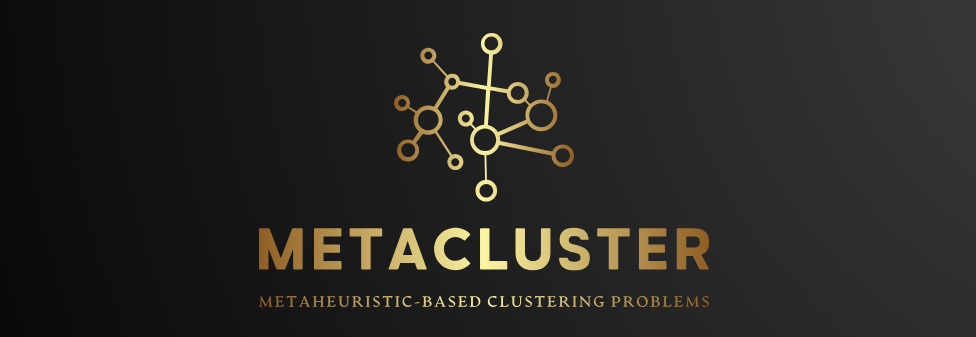MetaCluster is the largest open-source nature-inspired optimization (Metaheuristic Algorithms) library for clustering problem in Python
- Free software: GNU General Public License (GPL) V3 license
- Provided 3 classes:
MetaCluster,MhaKCentersClustering, andMhaKMeansTuner - Total nature-inspired metaheuristic optimizers (Metaheuristic Algorithms): > 200 optimizers
- Total objective functions (as fitness): > 40 objectives
- Total supported datasets: 48 datasets from Scikit learn, UCI, ELKI, KEEL...
- Total performance metrics: > 40 metrics
- Total different way of detecting the K value: >= 10 methods
- Documentation: https://metacluster.readthedocs.io/en/latest/
- Python versions: >= 3.7.x
- Dependencies: numpy, scipy, scikit-learn, pandas, mealpy, permetrics, plotly, kaleido
Please include these citations if you plan to use this library:
@article{VanThieu2023,
author = {Van Thieu, Nguyen and Oliva, Diego and Pérez-Cisneros, Marco},
title = {MetaCluster: An open-source Python library for metaheuristic-based clustering problems},
journal = {SoftwareX},
year = {2023},
pages = {101597},
volume = {24},
DOI = {10.1016/j.softx.2023.101597},
}
@article{van2023mealpy,
title={MEALPY: An open-source library for latest meta-heuristic algorithms in Python},
author={Van Thieu, Nguyen and Mirjalili, Seyedali},
journal={Journal of Systems Architecture},
year={2023},
publisher={Elsevier},
doi={10.1016/j.sysarc.2023.102871}
}
- Install the current PyPI release:
$ pip install metacluster==1.2.0- Install directly from source code
$ git clone https://github.com/thieu1995/metacluster.git
$ cd metacluster
$ python setup.py install- In case, you want to install the development version from Github:
$ pip install git+https://github.com/thieu1995/permetrics After installation, you can import MetaCluster as any other Python module:
$ python
>>> import metacluster
>>> metacluster.__version__We implement a dedicated Github repository for examples at MetaCluster_examples
Let's go through some basic examples from here:
# Load available dataset from MetaCluster
from metacluster import get_dataset
# Try unknown data
get_dataset("unknown")
# Enter: 1 -> This wil list all of avaialble dataset
data = get_dataset("Arrhythmia")- Or you can load your own dataset
import pandas as pd
from metacluster import Data
# load X and y
# NOTE MetaCluster accepts numpy arrays only, hence use the .values attribute
dataset = pd.read_csv('examples/dataset.csv', index_col=0).values
X, y = dataset[:, 0:-1], dataset[:, -1]
data = Data(X, y, name="my-dataset")You should confirm that your dataset is scaled and normalized
# MinMaxScaler
data.X, scaler = data.scale(data.X, method="MinMaxScaler", feature_range=(0, 1))
# StandardScaler
data.X, scaler = data.scale(data.X, method="StandardScaler")
# MaxAbsScaler
data.X, scaler = data.scale(data.X, method="MaxAbsScaler")
# RobustScaler
data.X, scaler = data.scale(data.X, method="RobustScaler")
# Normalizer
data.X, scaler = data.scale(data.X, method="Normalizer", norm="l2") # "l1" or "l2" or "max"3. Next, select Metaheuristic Algorithm, Its parameters, list of objectives, and list of performance metrics
list_optimizer = ["BaseFBIO", "OriginalGWO", "OriginalSMA"]
list_paras = [
{"name": "FBIO", "epoch": 10, "pop_size": 30},
{"name": "GWO", "epoch": 10, "pop_size": 30},
{"name": "SMA", "epoch": 10, "pop_size": 30}
]
list_obj = ["SI", "RSI"]
list_metric = ["BHI", "DBI", "DI", "CHI", "SSEI", "NMIS", "HS", "CS", "VMS", "HGS"]You can check all supported metaheuristic algorithms from: https://github.com/thieu1995/mealpy. All supported clustering objectives and metrics from: https://github.com/thieu1995/permetrics.
If you don't want to read the documents, you can print out all supported information by:
from metacluster import MetaCluster
# Get all supported methods and print them out
MetaCluster.get_support(name="all")model = MetaCluster(list_optimizer=list_optimizer, list_paras=list_paras, list_obj=list_obj, n_trials=3, seed=10)
model.execute(data=data, cluster_finder="elbow", list_metric=list_metric, save_path="history", verbose=False)
model.save_boxplots()
model.save_convergences()As you can see, you can define different datasets and using the same model to run it. Remember to set the name to your dataset, because the folder that hold your results is the name of your dataset. More examples can be found here
-
Official source code repo: https://github.com/thieu1995/metacluster
-
Official document: https://metacluster.readthedocs.io/
-
Download releases: https://pypi.org/project/metacluster/
-
Issue tracker: https://github.com/thieu1995/metacluster/issues
-
Notable changes log: https://github.com/thieu1995/metacluster/blob/master/ChangeLog.md
-
Official chat group: https://t.me/+fRVCJGuGJg1mNDg1
-
This project also related to our another projects which are optimization and machine learning. Check it here:
- https://github.com/thieu1995/metaheuristics
- https://github.com/thieu1995/mealpy
- https://github.com/thieu1995/mafese
- https://github.com/thieu1995/pfevaluator
- https://github.com/thieu1995/opfunu
- https://github.com/thieu1995/enoppy
- https://github.com/thieu1995/permetrics
- https://github.com/thieu1995/IntelELM
- https://github.com/thieu1995/MetaPerceptron
- https://github.com/thieu1995/GrafoRVFL
- https://github.com/aiir-team
1. https://jtemporal.com/kmeans-and-elbow-method/
2. https://medium.com/@masarudheena/4-best-ways-to-find-optimal-number-of-clusters-for-clustering-with-python-code-706199fa957c
3. https://github.com/minddrummer/gap/blob/master/gap/gap.py
4. https://www.tandfonline.com/doi/pdf/10.1080/03610927408827101
5. https://doi.org/10.1016/j.engappai.2018.03.013
6. https://github.com/tirthajyoti/Machine-Learning-with-Python/blob/master/Clustering-Dimensionality-Reduction/Clustering_metrics.ipynb
7. https://elki-project.github.io/
8. https://sci2s.ugr.es/keel/index.php
9. https://archive.ics.uci.edu/datasets
10. https://python-charts.com/distribution/box-plot-plotly/
11. https://plotly.com/python/box-plots/?_ga=2.50659434.2126348639.1688086416-114197406.1688086416#box-plot-styling-mean--standard-deviation











